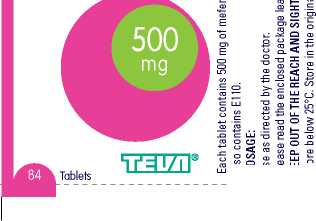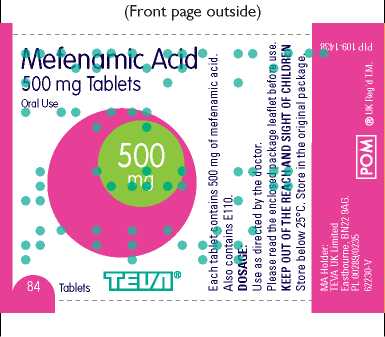Mefenamic Acid 500Mg Tablets
Base label (Selfadhesive) 45 mm
ro
-j-

10 mm Glue
55 mm
12 mm 3 Tab/Glue
For proofreading of Braille 45 mm
10 mm Glue
55 mm
Oral Use

< Q D CL S' M
Leaflet outside (Prima)
65 mm
Page 9
65 mm Page 10
65 mm Page 11
65 mm Page 12
65 mm Page 13
Braille reads (in Marburg medium font):
MEFENAMIC
ACID
# 500 MG
TABLETS
12 mm 3 Tab/Glue
Braille placement only 45 mm
10 mm Glue
55 mm
12 mm 3 Tab/Glue

• • • •
• •• • •• • •
• •
• • • •
• • • • •• ••
• • •• • •
• • • • •• •
• •
65 mm Page 14
55 mm Page 15
10 mm Glue
65 mm
An overdose is likely to cause headache, feeling sick, being sick, stomach pain, and rarely diarrhoea.
Please take this leaflet, any remaining tablets, and the container with you to the hospital or doctor so that they know which tablets were consumed. If you forget to take Mefenamic Acid
If you forget to take a tablet, take one as soon as you remember, unless it is nearly time to take the next one. DO NOT take a double dose to make up for a forgotten dose. Take the remaining doses at the correct time.
If you have any further questions on the use of this product, ask your doctor or pharmacist.
4. POSSIBLE SIDE EFFECTS
Like all medicines, Mefenamic Acid can cause side effects, although not everybody gets them.
Stop taking the tablets and tell your doctor immediately or go to the
casualty department at your nearest hospital if the following happens:
• an allergic reaction (swelling of the lips, face or neck leading to severe difficulty in breathing; asthma or worsening of existing asthma, skin rash or hives)
serious illness with blistering of the skin, mouth, eyes and genitals. These are very serious but rare side effects. You may need urgent medical attention or hospitalisation.
Stop taking the tablets and seek immediate medical help if the following happens at any time during your treatment: pass blood in your faeces (stools/motions) pass loose stools pass black tarry stools
vomit any blood or dark particles that look like coffee grounds.
Stop taking the tablets and tell your doctor if the following happens: indigestion or heartburn
stomach pain or other abnormal stomach symptoms.
The following side effects have also been reported:
Gastro-intestinal:
loss of appetite, inflammation or ulceration of the mouth e.g. mouth ulcers or cold sores, peptic ulcer with or without bleeding, oily appearance of stools, feeling sick, being sick, wind, constipation, chest pain due to stomach acidity, abdominal pain, worsening of colitis or
Crohn's disease, intestinal inflammatory disease , inflammation of the stomach and inflammation of the pancreas, which causes severe pain in the abdomen and back.
Elderly and debilitated patients seem to tolerate bleeding in the digestive track or ulceration less well than other patients. Greater caution should be taken when Mefenamic Acid is being taken by this group of patients.
Metabolism and nutritional:
glucose intolerance in diabetic patients
low blood levels of sodium which can cause tiredness and confusion, muscle twitching, fits or coma.
confusion, depression, hallucination, nervousness.
Eye:
eye irritation, temporary loss of colour vision, problems with sight.
Ear:
ear pain, ringing in the ears and a feeling of dizziness or "spinning" Respiratory:
asthma, shortness of breath.
Cardiovascular:
water retention, which may result in swollen ankles, high blood pressure and heart failure
medicines such as Mefenamic Acid may be associated with a small increased risk of heart attack ("myocardial infarction") or stroke palpitation, low blood pressure.
Kidney:
kidney problems including inflammation of the kidneys, difficulty in passing urine or painful urination, presence of blood in urine, increased amounts of protein in the urine, kidney disease, kidney toxicity and kidney function failure.
Liver:
abnormal liver function tests, inflammation of the liver and jaundice (yellowing of the skin or whites of the eyes), toxicity that damages the liver, rapid deterioration of kidney function due to liver failure.
Nervous system:
hazy vision, inflammation of the optic nerve, headaches, pin-and-needles or numbness, dizziness, fits, tiredness, drowsiness, difficulty in sleeping and a general feeling of being unwell aseptic meningitis (symptoms include stiff neck, headache, nausea, vomiting, fever and disorientation).
Blood:
reduction in red blood cells, which may cause paleness or yellowing of the skin and can also cause weakness or breathlessness (this generally stops after discontinuation of Mefenamic Acid), reduction in other blood cell counts, impaired blood cell production which may result in anaemia and reduced ability to fight infection and bruising or bleeding, decreased blood platelet counts, decreased white blood cell counts with a risk of getting infection more easily, infection in the blood stream, blood disorders, which may be characterised by fever or chills, sore throat, ulcers in your mouth or throat and blood clotting disorders. Skin:
sensitivity to light, swelling of the voice box, red rash, serious illness with blistering of the skin, mouth and eyes, sweating, itching and nettle rash.
General:
tiredness, general feeling of being unwell, multi-organ failure and fever. Effects on your test result:
a positive result in certain tests for bile (a digestive juice secreted by the liver) in the urine of patients receiving Mefenamic Acid has been demonstrated to be due to the presence of this medicine and not to the presence of bile.
If any of the side effects get serious, or if you notice any side effects not listed in this leaflet, please tell your doctor or pharmacist.
5. HOW TO STORE MEFENAMIC ACID
Keep out of the reach and sight of children. Store below 25°C. Store in the original package. Do not transfer them to another container.
Do not use Mefenamic Acid after the expiry date that is stated on the outer packaging. The expiry date refers to the last day of that month. Medicines should not be disposed of via wastewater or household waste. Ask your pharmacist how to dispose of medicines no longer required. These measures will help to protect the environment.
6. FURTHER INFORMATION
What Mefenamic Acid Tablets contain:
• The active ingredient is Mefenamic Acid 500 mg
• The other ingredients are microcrystalline cellulose, calcium
phosphate, croscarmellose sodium, povidone, sodium lauryl sulfate and stearic acid. The coating contains hypromellose, macrogols, and the colours quinoline yellow (E104), iron oxide yellow (E172), sunset yellow (E110) and titanium dioxide (E171)._
What Mefenamic Acid lablets look like and contents of the pack:
• Mefenamic Acid 500 mg Tablets are pale yellow, ovoid, film-coated tablets. They are engraved '3P2' on one side and plain on the reverse
• The tablets are available in pack sizes of 7, 10, 14, 21, 28,
30, 50, 56, 60, 84, 90, 100, 110, 112, 120, 150, 160, 168, 250, and 500.
Not all pack sizes may be marketed.
Marketing Authorisation Holder and Manufacturer
The Marketing Authorisation holder and company responsible for manufacture is TEVA UK Limited, Eastbourne, BN22 9AG.
This leaflet was last revised: March 2011 PL 00289/0235

12 mm Tab
Leaflet inside (Sekunda)
12 mm 65 mm 65 mm
Tab/Glue Page 1 Front page outside Page 2
65 mm Page 3
65 mm Page 4
65 mm Page 5
65 mm 65 mm 65 mm
Page 6 Page 7 Page 8
PACKAGE LEAFLET INFORMATION FOR THE USER
Read all of this leaflet carefully before you start taking this medicine.
• Keep this leaflet. You may need to read it again.
• If you have any further questions, ask your doctor or pharmacist.
• This medicine has been prescribed for you. Do not pass it on to others. It may harm them, even if their symptoms are the same as yours.
• If any of the side effects get serious, or if you notice any side effects not listed in this leaflet, please tell your doctor or pharmacist.
IN THIS LEAFLET:
1. What Mefenamic Acid is and what it is used for
2. Before you take Mefenamic Acid
3. How to take Mefenamic Acid
4. Possible side effects
5. How to store Mefenamic Acid
6. Further information
1. WHAT MEFENAMIC ACID IS AND WHAT IT IS USED FOR
Mefenamic Acid is a non-steroidal anti-inflammatory drug (NSAID) which is used to relieve pain, swelling, and fever.
Mefenamic Acid is used:
• to treat headache, toothache, menstrual pain, muscular pain and to help reduce excessive menstrual bleeding
• for long-term relief of pain and stiffness in rheumatoid arthritis and osteoarthritis
• to treat pain after an operation or giving birth.
2. BEFORE YOU TAKE MEFENAMIC ACID
DO NOT take Mefenamic Acid and consult your doctor if you:
• are allergic (hypersensitive) to Mefenamic Acid or any of the other ingredients of this medicine, aspirin or any other NSAlD e.g. ibuprofen
• are taking aspirin or any other NSAID, including cyclo-oxygenase-2-specific inhibitors
• have severe liver or kidney problems
• have severe heart failure, which can cause shortness of breath or ankle swelling
• are in the final 3 months of pregnancy
• have or have ever had, peptic ulceration (ulcer in your stomach or duodenum)
• have or have ever had bleeding in your digestive tract when you have taken NSAIDs in the past
• have inflammation of your bowels.
This medicine should not be taken for the treatment of pain after heart bypass surgery.
Take special care with Mefenamic Acid
Talk to your doctor before you start to take this medicine if you:
• are elderly
• are suffering from or have a history of bronchial asthma
• suffer from high blood pressure
• have heart failure or any other heart or vascular problems
• have mild kidney or liver problems
• suffer from ulcerative colitis or Crohn's disease
• suffer from systemic lupus erythematosus (inflammation of the connective tissue) or mixed connective tissue disease
• suffer from epilepsy
• are elderly and suffering from dehydration or kidney problems
• start developing rash, diarrhoea or a blood disorder or blood clotting problems after taking this medicine, please speak to your doctor immediately.
This medicine should be given with caution to patients with internal brain bleeding or abnormal bleeding disorders.
If this medicine fails to cure your menstrual pain or prolonged heavy menstrual bleeding please speak to your doctor immediately.
Prolonged use of this medicine for the treatment of headache can make them worse. Please speak to your doctor if this happens to you.
Medicines such as Mefenamic Acid may be associated with a small risk of heart attack ("myocardial infarction") or stroke. Any risk is more likely with high doses and prolonged treatment. Do not exceed the recommended dose or duration of treatment.
If you have heart problems, previous stroke or think that you might be at risk of these conditions (for example if you have high blood pressure, diabetes, or high cholesterol or are a smoker) you should discuss your treatment with your doctor or pharmacist.
Taking other medicines
DO NOT take Mefenamic Acid in combination with the following:
• aspirin or any other NSAID (e.g. ibuprofen), including
cyclo-oxygenase-2-specific inhibitors (e.g. celecoxib, meloxicam).
Talk to your doctor if you are taking any of the following:
• anticoagulants and antiplatelet agents (medicine used to reduce and/or prevent blood clots) e.g. warfarin, heparin
• diuretics ('water tablets') and antihypertensives (used to reduce your blood pressure)
• drugs that stimulate your heart (e.g. digoxin)
• ACE inhibitors and Angiotensin II receptor antagonists (both are used to treat high blood pressure e.g. enalapril, losartan)
• aminoglycoside (used to treat bacterial infection) e.g. gentamycin
• oral medicines for the treatment of high blood sugar e.g. tolbutamide
• lithium, or SSRI medicines (e.g. fluoxetine, used in the treatment of depression)
• methotrexate (used to treat cancer)
• ciclosporin or tacrolimus (used to prevent organ transplants being rejected)
• mifepristone in the last 8-12 days (used to terminate a pregnancy)
• probenecid (used for the treatment of painful inflammation of toes and feet)
• corticosteroids (e.g. hydrocortisone or prednisolone), or steroids (e.g. aldosterone)
• quinolone antibiotics (e.g. ciprofloxacin, norfloxacin or levofloxacin)
• zidovudine (used to treat HIV)
• any plasma protein binding medicines (e.g. lipoproteins or globulins).
Please tell your doctor or pharmacist if you are taking or have recently
taken any other medicines, including medicines obtained without a
prescription.
Pregnancy and breast-feeding
• DO NOT take Mefenamic Acid during the final 3 months of pregnancy
• If you are pregnant ask your doctor for advice before taking this medicine
• DO NOT take Mefenamic Acid if you are breast-feeding
• Mefenamic Acid may make it more difficult to become pregnant. You should speak to your doctor if you are planning to become pregnant or if you have problems becoming pregnant.
Driving and using machines
• Mefenamic Acid may make you feel drowsy, tired, or dizzy and affect your vision. DO NOT drive or operate machinery if you are affected.
Important information about some of the ingredients of Mefenamic Acid
• Patients should note that Mefenamic Acid tablets contain Sunset Yellow (E110), which may cause allergic reactions.
3. HOW TO TAKE MEFENAMIC ACID
Always take Mefenamic Acid exactly as your doctor has told you. You should check with your doctor or pharmacist if you are not sure.
If you are taking Mefenamic Acid for a long period of time your doctor should be carefully monitoring you and regular blood tests may be carried out. If you are at higher risk of suffering from intestinal bleeding e.g. you are taking high doses or are elderly, your doctor may also give you another medicine to take at the same time to protect your stomach. Speak to your doctor immediately, if you start to suffer from loose stools soon after starting this medicine.
If you see another doctor or go into hospital, let him or the staff know what medicines you are taking.
The tablets should be swallowed with a drink of water, preferably with or after food. The usual dose is:
• Adults
500 mg, three times a day.
Excessive menstrual bleeding
Mefenamic Acid should be taken on the first day of excessive bleeding.
Menstrual pain
Mefenamic Acid should be taken when the pain begins.
In both of these conditions, treatment will be continued according to your doctor's instructions.
• Elderly (over 65 years)
Your doctor will start you on the lowest effective dose and may monitor you at the beginning of your treatment for stomach bleeding.
• Children
Mefenamic Acid tablets are not suitable for use in children. An alternative form of Mefenamic Acid should be used.
If you take more Mefenamic Acid than you should
If you (or someone else) swallow a lot of the tablets all together, or if you think a child has swallowed any of the tablets, contact your nearest hospital casualty department or your doctor immediately.